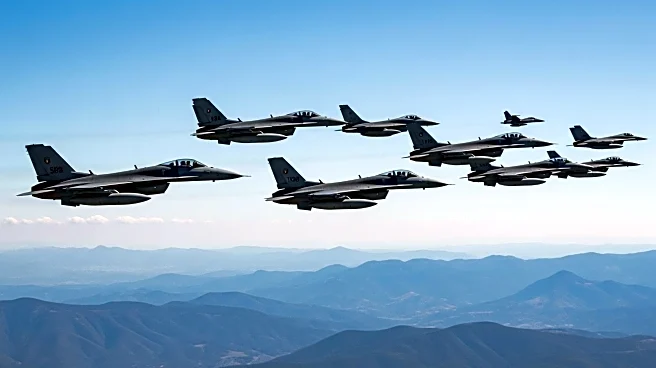What's Happening?
Poland activated its fighter jets to protect its airspace following extensive Russian drone and missile attacks across Ukraine, which resulted in the deaths of five people. The attacks, which included over 50 missiles and 500 drones, targeted critical infrastructure in nine Ukrainian regions, including Lviv. The Polish military reported that no airspace violations were detected, and operations returned to normal. The Netherlands, currently involved in NATO's air policing in Poland, also contributed F-35 stealth fighter jets to the response. The Russian Defense Ministry claimed responsibility for the strikes, stating they targeted Ukraine's gas, energy, and military facilities.
Why It's Important?
The incident underscores the ongoing tension between NATO and Russia, particularly as Russian military actions approach NATO borders. The alliance's response highlights the collective defense obligations under Article 5, although no direct attacks on NATO territory have been confirmed. The situation raises concerns about potential escalation, especially with discussions around the U.S. possibly supplying Ukraine with long-range Tomahawk missiles. Such a move could further strain U.S.-Russia relations, as indicated by Russian President Vladimir Putin's warnings of escalation. The attacks also emphasize the vulnerability of Ukrainian infrastructure and the need for enhanced defense capabilities.
What's Next?
The international community, particularly NATO and the U.S., may face increased pressure to respond to Russia's actions. Discussions around providing Ukraine with advanced weaponry, such as Tomahawk missiles, could intensify, potentially leading to further diplomatic tensions. The situation may also prompt NATO to reassess its defense strategies and readiness in Eastern Europe. Additionally, Ukraine is likely to continue seeking increased support from Western allies to bolster its defense against Russian aggression.
Beyond the Headlines
The ongoing conflict and Russia's aggressive tactics could have long-term implications for European security and energy policies. The attacks on Ukrainian infrastructure highlight the strategic importance of energy resources in the conflict, potentially influencing future energy security strategies in Europe. The situation also raises ethical questions about the impact of military actions on civilian populations and the international community's responsibility to protect human rights.









